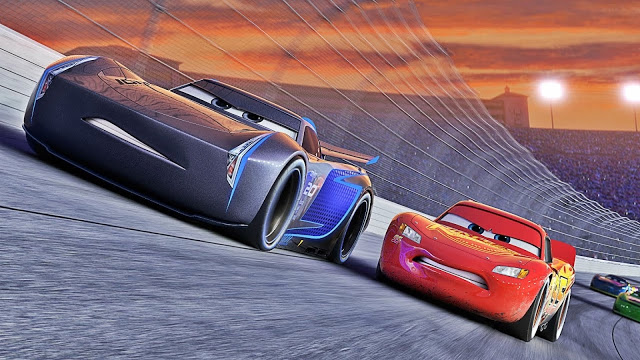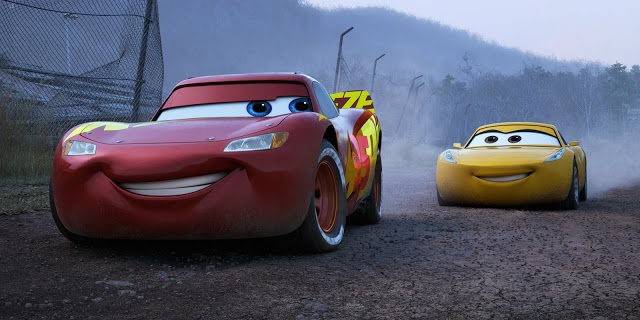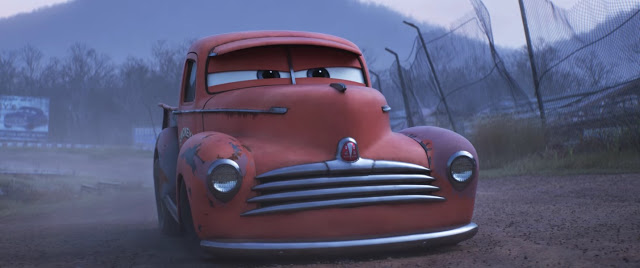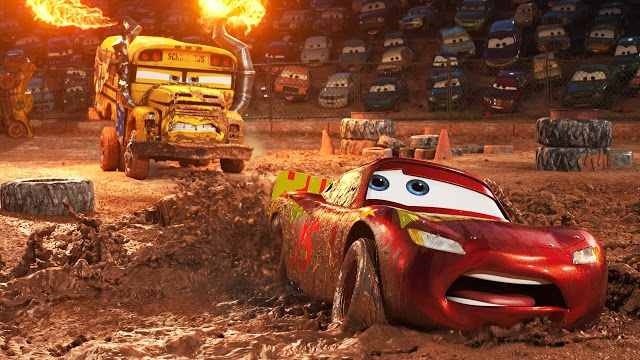Pixar’s best movies are so amazingly, miraculously good, their lesser efforts can become underappreciated by comparison. The common phrase “second-tier Pixar”—often applied to, say, the fairy-tale familiarity of Brave, the slobs-versus-snobs hijinks of Monsters University, or the poky adventure of The Good Dinosaur—necessarily implies a sense of relative failure, even if all of those films are variously rewarding. But the Cars movies are different. It remains vexing that the wizard studio—presumably motivated by merchandising rather than storytelling—has insisted on turning its least interesting property into a commodified, pandering franchise. (Of course, Pixar’s other trilogy is literally about products that are purchased for children, but the Toy Story pictures also happen to be great.) When the first Cars dropped in 2006, it immediately claimed the title of “worst Pixar movie ever made”, its airy pleasantness overshadowed by the string of ingenious hits that had preceded it. Five years later, Cars 2 took that title for its own; a stunningly stupid action-comedy centered on Larry the Cable Guy’s Mater (a character who makes Jar Jar Binks seem fascinating and three-dimensional), it wasn’t just a comparative disappointment—it was a legitimately bad movie.
Perhaps the nicest thing I can say about Cars 3 is that, following its release, the unofficial tally of “Bad Pixar Movies” remains stuck at one. That’s because this latest sequel—harmless and piddling, with just a whiff of thoughtfulness and originality—is too innocuous and well-meaning to be bad. But neither is it good enough to qualify as second-tier Pixar, a designation that confers with it an attempt at beauty, ambition, and imagination. Even the studio’s weaker films at least try to be memorable, but in its relentless congeniality, Cars 3 seems calculated to make as little impact as possible. No wonder its characters constantly drive around in circles.
Entirely (and blessedly) ignoring the existence of Cars 2, this third installment of vehicular anthropomorphism begins in familiar territory: the racetrack. In fact, it commences with the exact same opening sequence from the first Cars, as Lightning McQueen (voice of Owen Wilson), our favorite self-absorbed speedster, seeks to psych himself up before a big race. But where the original used its introductory set piece to illustrate Lightning’s narcissism and obnoxiousness, Cars 3 swiftly reassures us that he has suitably mellowed, appreciating his friends—all of whom are still varying degrees of irritating—and recognizing his membership within a larger team. No longer his own worst enemy, the threat to Lightning’s racing supremacy takes the form of Jackson Storm (Armie Hammer), a competitor who, with his angular body and black-and-purple color scheme, looks a bit like a horizontal version of Toy Story 2’s Emperor Zurg.
In positioning Storm—a young upstart who trains relentlessly on fancy new simulators and relies on statistical data to hone his craft—as Lightning’s antagonist, Cars 3 initially looms as a condescending, old-school-versus-new-school throwback, pitting Storm’s analytical precision against Lightning’s veteran savvy. (The scene in which a so-called analyst voiced by Kerry Washington lauds Storm’s devotion to the numbers—a devotion that is plainly meant to be mocked—made my inner sabermetrician cringe.) Thankfully, the movie, which was directed by Brian Fee from a script by three writers, declines to commit too deeply to this false dichotomy. Instead, to the extent that Cars 3 is actually about anything, it is the inexorability of aging. Lightning, for all his natural gifts, is getting old, and he realizes that in order to defeat this brash newcomer, he must adapt his methods and acknowledge his shortcomings.
It’s a decent enough theme, though a somewhat curious choice for a franchise that remains geared toward six-year-olds, who aren’t especially likely to leave the theater grappling with their own mortality. The real problem is that Cars 3 doesn’t do anything interesting with it. Instead, it lazily copies its narrative arc straight from the original Cars, in which the egomaniacal Lightning got marooned in a one-mustang town (sorry!), initially felt superior to its resident bumpkins, and gradually came to value their wholesome decency and relaxed philosophy. Here, desperate to prove himself, Lightning grudgingly agrees to work with Cruz Ramirez (Cristela Alonzo), a trainer who’s well-schooled in theoretical techniques but less familiar with the nuts and bolts of actual racing. Naturally, Lightning is at first agitated by Cruz’s inexperience, so you can be sure that, over the plodding course of the movie, his derision will slowly turn to admiration. The screenplay doesn’t even try to hide its parroting; when Lightning and Cruz team up with an elderly guru, Smokey (Chris Cooper), his grizzled mentorship reminds Lightning of Doc Hudson, the old-timer who, back in the first film, provided sage tutelage while speaking in the gruff growl of Paul Newman. And you had better believe that, just like Doc, Smokey has a few crafty tricks up his fenders that can help bring Lightning out of his slump.
This predictability would be more tolerable if Cars 3 moved with any real verve. But while the movie provides one sequence after another of revved engines, screeching wheels, and burnt rubber, it never translates that constant motion into actual energy. Even a muddy demolition derby on a figure-eight track, freed from the monotonous oval of the speedway (and featuring a vengeful school bus voiced by Orange Is the New Black’s Lea DeLaria), fails to generate any oomph, as Fee’s clumsy direction never establishes the participants’ geography—it’s loud, but it isn’t exciting. And visually, the animation is competent but far from dazzling, with nothing that approaches the stunning artistry of Finding Dory. Only when flecks of dirt or sprays of sand shoot into the air, each grain finely detailed, does Cars 3 announce itself as a Pixar product; otherwise, it feels like it could be the work of any kid-friendly studio.
Much like Monsters University, Cars 3—which is preceded by a characteristically charming short called “Lou”—manages to uncover a small degree of redemption in its final act, putting a relatively novel spin on the classical “final game” sports-movie cliché. (I could quibble with the logic of a certain maneuver in the pit area, but plausibility isn’t exactly this series’ focus.) It also manages some addition by subtraction; simply removing Mater and Lightning’s other friends from most of the action minimizes the film’s total number of grinding-the-gears moments. But while Cars 3 may not be consistently annoying, it mostly comes off as insipid. There’s no sense of genuine wonder here, just a creaky plot and a trite message.
“From this moment, everything will change,” the teaser for Cars 3 promised. There’s no shame in a studio trying to market its merchandise, but that tagline proves particularly inapt, given this movie’s insistence on playing things by the book. In fact, the nerviest thing that Cars 3 does is suggest that Lightning McQueen might finally need to retire, a scenario that becomes charged with an inadvertent meta boost. After sputtering around the racetrack for three bad-to-middling entries, it’s time for this inferior franchise to stay in the pits.
Jeremy Beck is the editor-in-chief of MovieManifesto. He watches more movies and television than he probably should.




